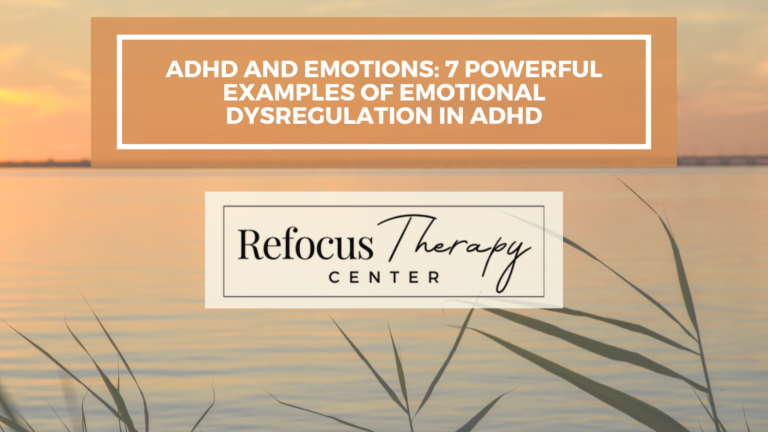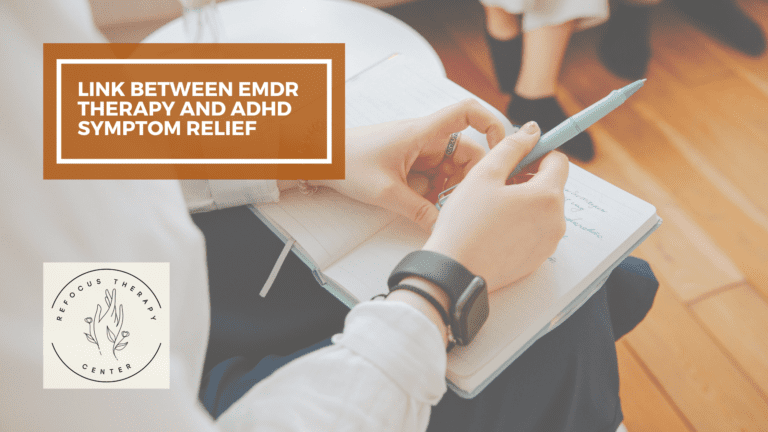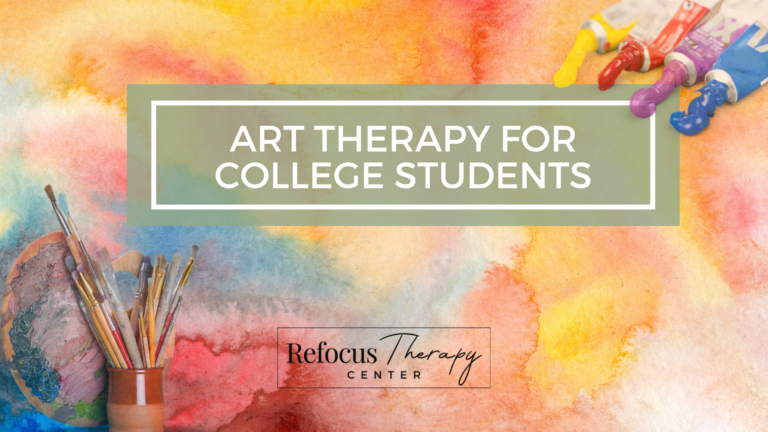are tired of their anxious thoughts
When most people think of ADHD, or Attention Deficit Hyperactivity Disorder, difficulty managing emotions is not usually the first thing that comes to mind. Most people often think of someone who is struggling to focus, easily distracted, or talks a lot.
ADHD and emotions management is often something not seen, or talked about. Yet, difficulty managing emotions can significantly impact daily life, relationships, and self-esteem for someone with ADHD.
Did you know that difficulty managing emotions is a common symptom of ADHD? ADHD and emotions is also often overlooked. As a therapist, I have encountered so many individuals with ADHD who have told me they were diagnosed with things like: Anxiety, depression, Borderline Personality Disorder, OCD, bipolar, etc, before finally getting diagnosed with ADHD. This often times leads to misdiagnosis or underdiagnosis, because symptoms of emotional dysregulation can often mimic other disorders.
So, what is Emotional Dysregulation anyway?
ADHD and emotion dysregulation is characterized by difficulties in managing emotional reactions and returning to a stable emotional state after being upset. Individuals with ADHD often struggle with difficulty in modulating emotional reactions.
Emotional dysregulation involves difficulty in managing emotional responses appropriately to situations, leading to reactions that may seem over the top or extreme.
This can manifest as:
- intense emotions over seemingly minor issues
- sudden mood changes
- prolonged periods of emotional distress
Here are some examples of what emotional dysregulation might look:
Intense Emotional Reactions to Minor Events
In Real Life this might look like: You are getting ready for work, have everything packed up, headed out the door, and you spill your coffee. The moment the coffee hits the floor, a wave of anger, frustration, and self-criticism washes over you. You become angry because you “can’t do anything right,” as feelings of incompetence, and shame take over, you feel like crying, screaming, calling out of work.

ADHD and emotions: This reaction isn’t about spilling coffee or being clumsy. It’s an example of how their brain processes emotions differently. The intense response is due to a difficulty in modulating emotional reactions. For some this might seem like an annoying inconvenience, however for someone experiencing difficulty managing emotions their response may look like: meltdown, tears, feelings of panic, anger, overwhelming frustration, negative self-talk, difficulty regaining composure.
Rapid Mood Swings
In Real Life this might look like: You’re having a good day, laughing with friends over lunch, when suddenly a comment your friend makes hits you the wrong way. It felt like a dig or an attack on you. Within moments, your mood plummets; you’re fighting back tears or feeling unexpectedly angry, struggling to understand why you can’t “just let it go.”
What started as a small comment spirals into hours of overthinking, negatively impacting your mood and productivity for the rest of the day. The comment replays in your mind, each time accompanied by a fresh wave of frustration.
ADHD and emotions: This persistent fixation and inability to “let go” of the comment are indicative of difficulty managing emotions. It’s not a choice or a refusal to move past the comment; rather, it’s a manifestation of the brain’s struggle to process and regulate emotional responses effectively.
With ADHD and emotions, these experiences are compounded by challenges with executive function, making it harder to shift attention away from negative emotions and return to a state of emotional regulation. This sudden shift from being happy to feeling upset isn’t simply being “over-sensitive.” It’s an uncontrollable swing in emotions, where the brain’s regulatory mechanisms overshoot or undershoot their response, turning a laughable moment into a source of pain or anger.
Difficulty Returning to a Baseline Emotional State
In Real Life this might look like: You and your partner are trying to decide where to go for dinner, which turns into a disagreement over the choice of restaurant. You find yourself becoming more and more irritated. This escalates into a silent standoff. The rest of the evening, which was meant for relaxation, is overshadowed by a pervasive sense of annoyance and discontent.
ADHD and emotions: This isn’t about dinner choices. The irritation from the disagreement doesn’t ebb as it might for others; instead, it deepens, into hours or even days of rumination, self-criticism, and lingering upset. The incident morphs into a significant source of emotional turmoil, replaying in their mind, magnified and inescapable. This disproportionate fixation is less about the specific issue and more about the challenge in managing emotional responses.
Impulsive Responses to Emotional Discomfort
In Real Life this might look like: You’re working on a group project and someone on the team criticizes part of your work. Instantly, you feel a surge of anger and defensiveness. Without thinking, you snap back with frustration, surprising even yourself with the intensity of your reaction. You later ruminate on this interaction, feeling guilty and upset by your inability to control your immediate response.
ADHD and emotions: This scenario isn’t simply about receiving feedback; it’s a battle against the tidal wave of emotions that such feedback unleashes. The immediate reply or contemplation of resignation is not a measured response but an impulsive attempt to cope with feelings of inadequacy and rejection. For individuals with difficulty managing emotions, especially those with ADHD, the rush to act is an attempt to escape discomfort. This impulsive behavior underscores the intense need for relief from emotions, regardless of the consequences.
Struggle with Rejection Sensitivity
In Real Life this might look like: You text a friend to hang out, but they don’t reply for a few hours. Your mind races with thoughts that they’re ignoring you or no longer care about your friendship. The lack of an immediate response leads to feelings of rejection and loneliness, overshadowing your day with a sense of unworthiness and doubt about your relationships.
ADHD and emotions: This feels like a betrayal, and a confirmation of unworthiness. It’s not about feeling disappointed, but the fear of rejection, negative view of self, and anxiety.
Overwhelm Leading to Shutdown or Outbursts
In Real Life this might look like: You are at a crowded event and it is loud.. You start to feel overwhelmed, between the conversations happening around you, glasses clinking, music, and social interaction, it begins to feel suffocating. For others, it’s a lively atmosphere, but for you, it feels unbearable, pushing you to either want to leave, immediately, or feel annoyed/irritable at the next person who tries to talk to you.
ADHD and emotions: This can cause a “fight, flight, or freeze” response, intensified by the inability to regulate emotional responses to stress. The overwhelm isn’t just about the noise, but the brain’s heightened reaction to perceived threats or pressure. The shutdown or outburst is a direct result of emotional dysregulation, where the individual’s capacity to cope with stress is overwhelmed, leading to extreme reactions that are out of sync with the actual demands of the situation. The desire to leave isn’t rude or antisocial; it’s a visceral response to overwhelming sensory and emotional input. In individuals with ADHD and emotions dysregulation, such situations can quickly escalate from being merely uncomfortable to intolerable.
Difficulty in Emotional Expression
In Real Life this might look like: You and your partner have a disagreement over what to do this weekend. While you want to express how you’re feeling—maybe you’re hurt by a comment they made or frustrated by the misunderstanding—you find it hard to put your emotions into words. Instead of opening up about your feelings, you retreat into silence or change the subject, leaving the issue unresolved.
ADHD and emotions: This isn’t just a simple communication barrier. The intensity of your emotions during the disagreement feels overwhelming, and the fear of escalation or not being understood make it difficult to express how you feel. You may find yourself thinking about the conversation, feeling stuck with the emotions, and regretting not talking to your partner about how you felt. This struggle to communicate effectively can lead to feelings of isolation within the relationship, even when you deeply wish to connect and resolve the issue.
The Broad Impact of Emotional Dysregulation


Effects of difficulty managing emotions can make many situations very stressful. Relationships may suffer as friends and family struggle to understand the intensity of reactions. School and work can be affected, where the standard challenges of ADHD are compounded by emotional reactions. This can lead to a cycle of stress, frustration, and feelings of inadequacy, affecting self esteem and mental health.
ADHD and Emotions: The Connection
The link between ADHD and difficulty managing emotions is rooted in shared neurobiological pathways, particularly those related to executive functioning. Executive functions are crucial for regulating thoughts, actions, and emotions. In ADHD, impairments in these areas can lead to a decreased ability to manage emotional responses effectively, leading to the symptoms of difficulty managing emotions.
Exploring Treatment around ADHD and Emotions
Addressing emotional dysregulation within the ADHD treatment is important. Treatment for 

CBT, DBT, mindfulness practices, EMDR, and skills training, when adapted for ADHD and neurodivergent affirming strategies, can be helpful in supporting and managing emotional regulation.
Implementing Practical Strategies
Several practical tools and strategies can be beneficial:
- Structured Daily Routines: Creating and adhering to a structured daily routine can significantly reduce feelings of overwhelm and anxiety, providing a predictable framework that enhances emotional stability
- Mindfulness and Relaxation Techniques: Practices such as meditation, deep breathing exercises, and progressive muscle relaxation can help in managing momentary emotional distress and improving overall emotional regulation.
- Emotion Tracking: Keeping a detailed journal of emotional experiences, triggers, and coping strategies that were effective (or not) can provide valuable insights into patterns of difficulty managing emotions and guide the development of personalized management strategies.
- Physical Activity: Regular physical activity has been shown to have a positive effect on mood and can be a valuable component of a comprehensive strategy to manage emotional expression.
- Mental Health Therapy: Therapy can be a great resource for working on ADHD symptoms and emotional regulation, however it is recommended to work with a therapist who understands ADHD and is neurodivergent affirming.
The Role of Trauma-Informed Care for ADHD and emotions
For many, difficulty with emotional control is connected to experiences of past trauma. Adopting a trauma-informed approach in therapy ensures a safe, respectful, and supportive environment, allowing individuals to explore and heal from past traumas that exacerbate their current emotional struggles. When coping with ADHD and navigating emotions, having a trauma informed approach can be helpful in supporting the whole person.
Take away
Living with ADHD and emotions that feel overwhelming has its own challenges, but with targeted support and effective strategies, it is possible to navigate successfully. Understanding how emotional dysregulation can affect someone with ADHD is so important. If you have ADHD and struggle with regulating your emotions, we now know this makes so much sense. Therapy can be helpful in sorting through the mess, and figuring out how to manage it.
Embracing the journey of understanding ADHD in its entirety, including its emotional dimensions, opens the door to a life marked by greater stability, fulfillment, and growth.
Let’s Connect – Next Steps
If you or someone you know is looking for support for ADHD and emotions, learning to better navigate emotions, and is considering therapy in Florida, call or text us today at 407-449-2295. We provide neurodivergent affirming care to help individuals with ADHD to navigate, understand, and better control their emotions.
Additional stuff to check out:
Books to check out
The Neurodivergent Friendly Workbook of DBT Skills
Your Brain’s Not Broken: Strategies for Navigating Your Emotions and Life with ADHD
Scattered Minds: The Origins and Healing of Attention Deficit Disorder
Scientific Articles and Journals
Emotion Dysregulation in Attention Deficit Hyperactivity Disorder
Emotion dysregulation in adults with attention deficit hyperactivity disorder: a meta-analysis
Support Groups and Forums
ADD Forums – ADHD Support and Community
ADHD Support Community on Reddit
Therapy Resources
Related Blog Posts:
Navigating a Relationship with a Partner Who Has ADHD
Navigating life’s challenges doesn’t have to be a journey taken alone. Do you have so much to do, but you find yourself glued to the couch? Whether you’re adjusting to college life, ADHD in professional settings, or seeking strategies to manage anxiety, our virtual therapy services offer the support you need from the comfort of your own space. Specializing in therapy for college students, including UF and UCF students, and professionals with ADHD, we understand the unique stressors you face. Our practice, serving areas across Florida including Gainesville, Orlando, and Tampa, provides trauma-informed care. With a range of therapeutic approaches like EMDR, DBT, CBT, and IFS-informed therapy, we tailor our support to meet your individual needs. If you’re looking for a guiding hand to navigate through these times, counseling can offer the clarity and tools you need to move forward. Call us or text us today at 407-449-2295. Experience compassionate, individualized care designed to support you through every step of your journey. We are located in Gainesville, Florida and provide individual therapy.










